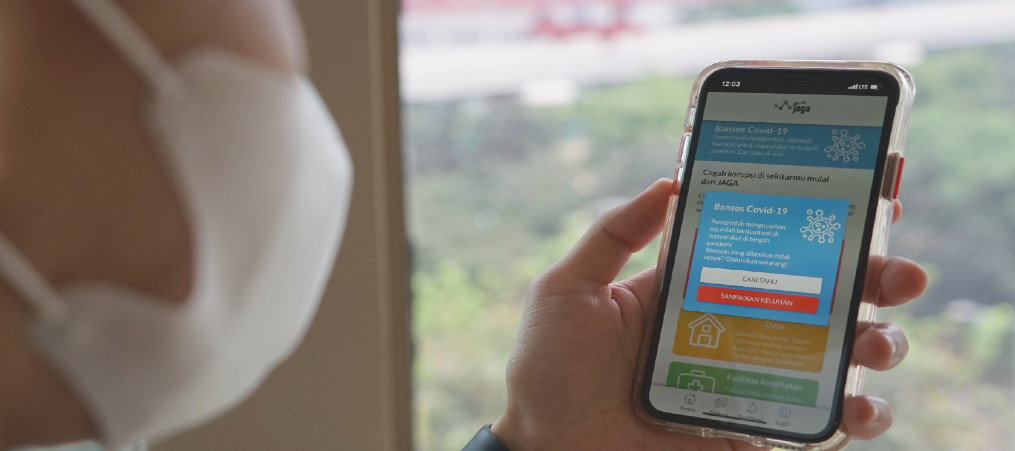Jakarta, 29 May 2020. The Corruption Eradication Commission officially added the JAGA Bansos (guarding social assistance) feature to the JAGA application. The JAGA application can be downloaded by the public using devices with the Android or iOS operating system. Apart from using devices, the public can also access JAGA through the website https://jaga.id.
The public can use this new feature to report suspected abuse or misuse of social assistance. Not only that, JAGA Bansos also provides information about social assistance.
Complaints or reports submitted to JAGA Bansos will be received by the KPK, and then forwarded to the relevant local government body. The KPK passes information from the public through the Regional Coordination Unit for Prevention. Next, the KPK will monitor the response on the resolution of these public reports and complaints.
"We hope that the public can trust (us) in providing information through the JAGA Bansos feature, because this can be a channel where the community plays an active role in supervising the allocation of social assistance and preventing potential corruption," said KPK Commissioner Firli Bahuri in the launching of the JAGA Bansos feature during an online press conference through the KPK Youtube account.
The introduction of the JAGA Bansos feature is the additional effort made by the KPK in taking anticipatory measures to prevent corruption. The KPK has mitigated critical points that are prone to corruption in the response to the Corona Virus Disease 2019 (Covid-19) pandemic.
The KPK has identified one of the hot spots of corruption, which is related to the implementation of social assistance as part of the Social Safety Net (JPS). The central and regional governments have reallocated significant portions of their budget for JPS.
At the central government, social assistance is part of the component of JPS which is valued at Rp110 trillion from the total Rp405 trillion budget allocation. Meanwhile, from the reallocation total of the local government budget of Rp67.32 trillion, it was recorded that Rp25 trillion would be provided to the public in the form of social assistance.
Other social assistance allocations come from the Village Fund (Dana Desa), which is allocated in stages, namely 25%-35% of the amount of Village Fund or a total of Rp21 trillion.
Until now, the central government has provided regular social assistance in the form of the Family Hope Program (PKH), Non-Cash Food Assistance (BPNT), and Direct Cash Assistance (BLT). With the pandemic, the coverage of aid recipients has been expanded and the amount of aid has been increased. Additionally, a new form of assistance was introduced, namely staple commodities and cash assistance for Jakarta, Bodetabek as well as outside the Jabodetabek area.
At the regional level, the distribution of social assistance is also carried out by the provincial, district, and city governments using the reallocation of the APBD. As such, currently there are at least 7 types of assistance that are aimed at poor people as well as those who are vulnerable to becoming poor due to the pandemic.
In its implementation, the KPK found that the distribution of the 7 types of social assistance caused uproars in the communities of a number of areas. One of the main problems is that the local government has not updated the DTKS (Integrated Social Welfare Data). In addition, the KPK found that some members of the public had an incorrect understanding regarding the beneficiaries of social assistance. Therefore, the KPK considers that it is important to provide education to the public about the types of social assistance, the criteria for receiving assistance, and the fact that communities do not receive all types of social assistance, but rather each type of social assistance is substitutive of one another.
The vulnerability of misappropriation in the distribution of social assistance has encouraged KPK to take anticipatory steps. One of these steps is the issuing of Circular Letter No. 11 of 2020 concerning the use of DTKS and non-DTKS data in the distribution of social assistance to the community.
Through this Circular Letter, the KPK encourages the use of DTKS as well as the opportunity to update DTKS by the local government through social services. The data is then matched with the Identity Number (NIK). The data of beneficiaries, which is ‘by name’ and ‘by address’, is believed to be real when there is a NIK. Currently, the matching of 96 million DTKS data is in progress with around 70 million already matched or having a NIK.
The KPK also asked Ministries/Institutions/Local Governments and other agencies to be transparent and accountable when distributing assistance by opening access to data regarding recipients of aid, realization of aid, and available budget. The KPK also appealed for agencies to provide facilities for public complaint service.
The Corruption Eradication Commission expects that the existence of the JAGA Bansos function will not only help the community protect their rights, but also make the public joint supervisors in the implementation of government duties in ensuring the welfare of the community during the pandemic.
The Press Conference can be accessed through the following KPK YouTube link: https://www.youtube.com/watch?v=Sy_NF2Y_BXw
Public Relations
Corruption Eradication Commission
Jl. Kuningan Persada Kav 4, Jakarta Selatan
Call Center KPK: 198
(021) 2557-8300
